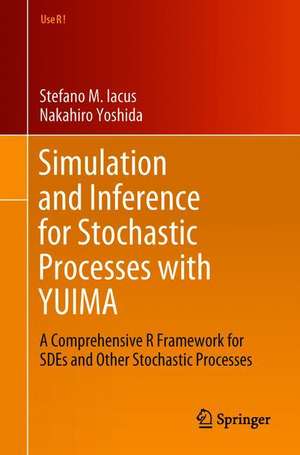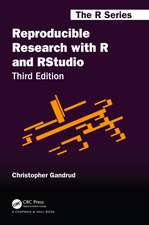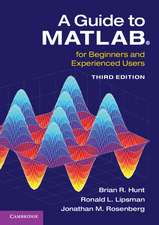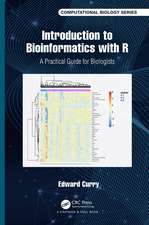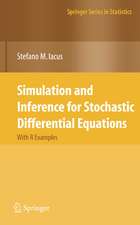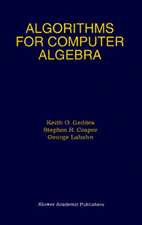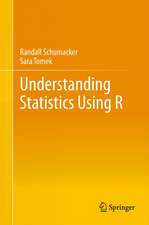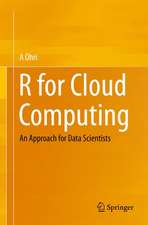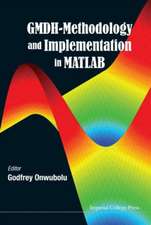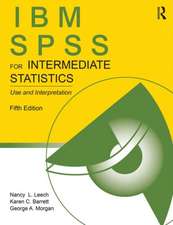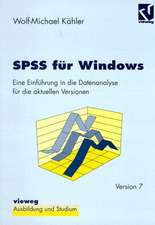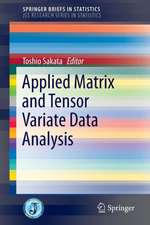Simulation and Inference for Stochastic Processes with YUIMA: A Comprehensive R Framework for SDEs and Other Stochastic Processes: Use R!
Autor Stefano M. Iacus, Nakahiro Yoshidaen Limba Engleză Paperback – 12 iun 2018
Din seria Use R!
- 15%
 Preț: 676.86 lei
Preț: 676.86 lei - 17%
 Preț: 362.75 lei
Preț: 362.75 lei - 15%
 Preț: 591.79 lei
Preț: 591.79 lei - 17%
 Preț: 461.37 lei
Preț: 461.37 lei -
 Preț: 226.74 lei
Preț: 226.74 lei - 17%
 Preț: 395.94 lei
Preț: 395.94 lei -
 Preț: 374.87 lei
Preț: 374.87 lei - 20%
 Preț: 500.66 lei
Preț: 500.66 lei - 17%
 Preț: 396.92 lei
Preț: 396.92 lei - 15%
 Preț: 360.59 lei
Preț: 360.59 lei - 17%
 Preț: 430.21 lei
Preț: 430.21 lei -
 Preț: 276.09 lei
Preț: 276.09 lei - 15%
 Preț: 497.12 lei
Preț: 497.12 lei - 15%
 Preț: 471.53 lei
Preț: 471.53 lei - 15%
 Preț: 525.35 lei
Preț: 525.35 lei -
 Preț: 489.30 lei
Preț: 489.30 lei - 15%
 Preț: 523.07 lei
Preț: 523.07 lei -
 Preț: 455.89 lei
Preț: 455.89 lei - 15%
 Preț: 518.73 lei
Preț: 518.73 lei - 18%
 Preț: 835.24 lei
Preț: 835.24 lei - 15%
 Preț: 498.94 lei
Preț: 498.94 lei - 18%
 Preț: 783.35 lei
Preț: 783.35 lei - 18%
 Preț: 783.20 lei
Preț: 783.20 lei - 15%
 Preț: 523.91 lei
Preț: 523.91 lei -
 Preț: 484.47 lei
Preț: 484.47 lei -
 Preț: 420.40 lei
Preț: 420.40 lei - 15%
 Preț: 523.07 lei
Preț: 523.07 lei -
 Preț: 419.06 lei
Preț: 419.06 lei - 15%
 Preț: 695.70 lei
Preț: 695.70 lei - 15%
 Preț: 499.12 lei
Preț: 499.12 lei - 15%
 Preț: 493.89 lei
Preț: 493.89 lei - 15%
 Preț: 584.10 lei
Preț: 584.10 lei - 15%
 Preț: 591.47 lei
Preț: 591.47 lei - 15%
 Preț: 497.31 lei
Preț: 497.31 lei - 15%
 Preț: 696.02 lei
Preț: 696.02 lei -
 Preț: 420.02 lei
Preț: 420.02 lei -
 Preț: 489.87 lei
Preț: 489.87 lei - 15%
 Preț: 579.66 lei
Preț: 579.66 lei -
 Preț: 486.42 lei
Preț: 486.42 lei - 15%
 Preț: 507.95 lei
Preț: 507.95 lei -
 Preț: 388.34 lei
Preț: 388.34 lei - 15%
 Preț: 496.67 lei
Preț: 496.67 lei -
 Preț: 423.47 lei
Preț: 423.47 lei - 15%
 Preț: 520.61 lei
Preț: 520.61 lei - 15%
 Preț: 531.26 lei
Preț: 531.26 lei - 15%
 Preț: 576.52 lei
Preț: 576.52 lei -
 Preț: 454.16 lei
Preț: 454.16 lei
Preț: 362.16 lei
Preț vechi: 436.33 lei
-17% Nou
Puncte Express: 543
Preț estimativ în valută:
69.30€ • 72.36$ • 57.22£
69.30€ • 72.36$ • 57.22£
Carte disponibilă
Livrare economică 25 martie-08 aprilie
Livrare express 08-14 martie pentru 28.91 lei
Preluare comenzi: 021 569.72.76
Specificații
ISBN-13: 9783319555676
ISBN-10: 3319555677
Pagini: 270
Ilustrații: XIII, 268 p. 83 illus., 32 illus. in color.
Dimensiuni: 155 x 235 x 19 mm
Greutate: 0.4 kg
Ediția:1st ed. 2018
Editura: Springer International Publishing
Colecția Springer
Seria Use R!
Locul publicării:Cham, Switzerland
ISBN-10: 3319555677
Pagini: 270
Ilustrații: XIII, 268 p. 83 illus., 32 illus. in color.
Dimensiuni: 155 x 235 x 19 mm
Greutate: 0.4 kg
Ediția:1st ed. 2018
Editura: Springer International Publishing
Colecția Springer
Seria Use R!
Locul publicării:Cham, Switzerland
Cuprins
1 Introduction.- 2 Diffusion processes.- 3 Compound Poisson processes.- 4 Stochastic differential equations driven by Lévy processes.- 5 Stochastic differential equations driven by the fractional Brownian motion.- 6 CARMA models.- 7 COGARCH models.- Reference.- Index.
Notă biografică
Stefano M. Iacus, PhD, is full professor of statistics in the Department of Economics, Management and Quantitative Methods at the University of Milan. He has been a member of the R Core Team (1999-2014) for the development of the R statistical environment and is now a member of the R Foundation. His research interests include inference for stochastic processes, simulation, computational statistics, causal inference, text mining, and sentiment analysis.
Nakahiro Yoshida, PhD, is full professor at the Graduate School of Mathematical Sciences, University of Tokyo. He is working in theoretical statistics, probability theory, computational statistics, and financial data analysis. He was awarded the Japan Statistical Society Award in 2009 and the Analysis Prize from the Mathematical Society of Japan in 2006.
Nakahiro Yoshida, PhD, is full professor at the Graduate School of Mathematical Sciences, University of Tokyo. He is working in theoretical statistics, probability theory, computational statistics, and financial data analysis. He was awarded the Japan Statistical Society Award in 2009 and the Analysis Prize from the Mathematical Society of Japan in 2006.
Textul de pe ultima copertă
The YUIMA package is the first comprehensive R framework based on S4 classes and methods which allows for the simulation of stochastic differential equations driven by Wiener process, Lévy processes or fractional Brownian motion, as well as CARMA processes. The package performs various central statistical analyses such as quasi maximum likelihood estimation, adaptive Bayes estimation, structural change point analysis, hypotheses testing, asynchronous covariance estimation, lead-lag estimation, LASSO model selection, and so on. YUIMA also supports stochastic numerical analysis by fast computation of the expected value of functionals of stochastic processes through automatic asymptotic expansion by means of the Malliavin calculus. All models can be multidimensional, multiparametric or non parametric.The book explains briefly the underlying theory for simulation and inference of several classes of stochastic processes and then presents both simulation experiments and applications to realdata. Although these processes have been originally proposed in physics and more recently in finance, they are becoming popular also in biology due to the fact the time course experimental data are now available. The YUIMA package, already available on CRAN, can be freely downloaded and this companion book will make the user able to start his or her analysis from the first page.
Stefano M. Iacus, PhD, is full professor of statistics the Department of Economics, Management and Quantitative Methods at the University of Milan. He has been a member of the RCore Team (1999-2014) for the development of the R statistical environment and now member of the R Foundation. His research interests include inference for stochastic processes, simulation, computational statistics, causal inference, text mining, and sentiment analysis.
- Contains both theory and code with step-by-step examples and figures
- Uses YUIMA package to implement the latest techniques available in the literature of inference for stochastic processes
- Shows how to create the description of very abstract models in the same way they are described in theoretical papers but with an extremely easy interface
Stefano M. Iacus, PhD, is full professor of statistics the Department of Economics, Management and Quantitative Methods at the University of Milan. He has been a member of the RCore Team (1999-2014) for the development of the R statistical environment and now member of the R Foundation. His research interests include inference for stochastic processes, simulation, computational statistics, causal inference, text mining, and sentiment analysis.
Nakahiro Yoshida, PhD, is a professor at the Graduate School of Mathematical Sciences, University of Tokyo. He is working in theoretical statistics, probability theory, computational statistics, and financial data analysis. He was awarded the Japan Statistical Society Award in 2009 and the Analysis Prize from the Mathematical Society of Japan in 2006.
Caracteristici
Contains both theory and R code with step-by-step examples and figures Uses YUIMA package to implement the latest techniques available in the literature of inference and simulation for stochastic processes Shows how to create the description of very abstract models in the same way they are described in theoretical papers but with an extremely easy interface
